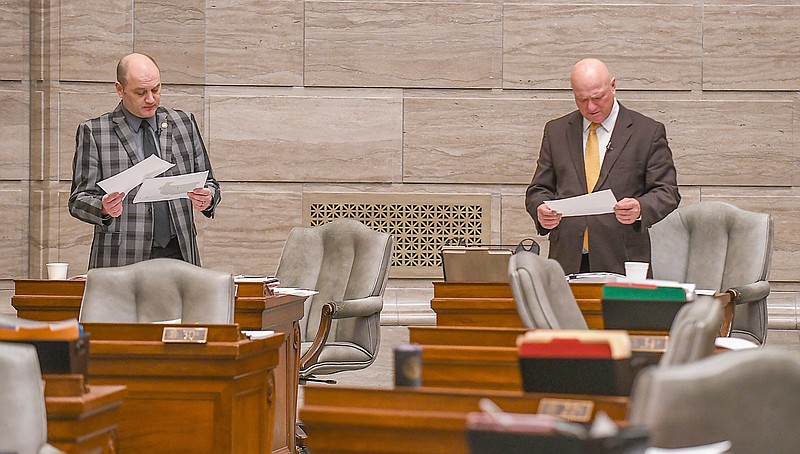A program to incentivize investments in small, rural businesses is progressing through the Missouri Legislature through several vehicles.
The Senate Agriculture, Food Production and Outdoor Resources Committee heard two identical bills Monday establishing the Missouri Rural Workforce Development Act. The committee then advanced the program as additions to two separate pieces of legislation.
Senate Bill 675, sponsored by Sen. Justin Brown, R-Rolla, and SB 905, sponsored by Sen. Denny Hoskins, R-Warrensburg, would establish the Missouri Rural Workforce Development Act and provide tax credits for investments in rural businesses.
Both bills outline a program for providing tax credits to Missourians who invest in rural area businesses through a rural fund.
The investment is good for a six-year tax credit equal to 0 percent of the capital investment for the first two years and then growing to 15 percent for the final four years. Both bills cap authorization of tax credits at $25 billion per year.
Rural funds, which are rural and small-business investment companies certified by the Department of Economic Development, would be required to invest in Missouri businesses with fewer than 250 employees.
Rural funds have to invest at least 60 percent of received funds in eligible businesses within two years and 100 percent in three years or risk the Department of Economic Development recapturing tax credits.
Sen. Mike Bernskoetter, R-Jefferson City, chairs the committee and said he wanted to hear both bills at the same time to save time and efficiently gather testimony.
Brown said he sees the program as a way to help cover startup and expansion costs for rural businesses.
"It's challenging enough for businesses in urban areas where financing options are not right down the street with big banks and venture capital," he said. "For rural, small businesses, it can feel impossible."
Brown said he's been interested in carrying the legislation for years because of the impact it could have on young entrepreneurs graduating from the University of Missouri Science and Technology in his district.
He said students often leave the university area for a better chance at securing startup financing.
"A lot of times if you don't have anything to leverage, you're not going to be able to start these companies," Brown said. "The City of Rolla and the County of Phelps has really missed out on a lot of opportunities to retain those students that want to start these companies and stay close to the university."
Brown said economic conditions and rising interest rates are also factors to consider for businesses in rural areas.
He said the state could offer one of the best avenues for Missourians in rural areas starting a new business or looking to expand operations.
"If you don't walk into a bank right now with a darn-good pro forma and 20 percent down, I'll just about bet you these banks aren't even going to look at you for a while," Brown said. "Especially on a startup."
Hoskins, sponsor of the identical bill and a member of the committee, said he agreed with Brown and supported the committee substitutes.
"Ditto to whatever Sen. Brown said," Hoskins voiced near the end of the hearing.
At Monday's hearing, representatives from the Associated Industries of Missouri, Missouri Soybean Association, Association of Electric Cooperatives and Missouri Chamber of Commerce and Industry spoke in favor of the bills. No one spoke in opposition to them.
Bernskoetter repeatedly asked the witnesses about how they define rural areas of the state, noting the legislation's definition has changed from counties with less than 120,000 people to counties with less than 80,000 people. He said he supports defining rural areas as counties with less than 50,000, which is the federal government's definition.
Brown said 100 counties would qualify as rural under the bill's 80,000 population definition and 15 don't. By dropping down to 50,000, he said an additional seven counties would be left out, including Pulaski, Taney and Newton counties.
"And they are rural," Brown said. "I mean, I've got municipalities in Pulaski County that you can't get cell phone service at their city hall."
Proponents of the 80,000 threshold argued a 50,000 population definition would limit opportunities for small businesses in areas where there is high demand for investment programs.
Bernskoetter said the more limited definition would actually broaden the opportunity for businesses in areas with the greatest needs.
In an executive session immediately following the hearing, Bernskoetter moved to consider a Senate committee substitute of HB 1720 that adds the Missouri Rural Workforce Development Act to the lower chamber's bill. It passed out of committee and is heading to the Senate floor.
The committee also passed a substitute for SB 750, a bill relating to anhydrous ammonia Bernskoetter introduced earlier in the session. The substitute is the same as the substitute for HB 1720 and also includes the Missouri Rural Workforce Development Act. The bill will also be heading to the Senate floor.
"We have multiple vehicles to get the same thing done," Bernskoetter said. "One of them was the House version and one was the Senate version, just to have multiple vehicles."
SB 675: Missouri Rural Workforce Development Act
Sponsor: Sen. Justin Brown
SB 905: Missouri Rural Workforce Development Act
Sponsor: Sen. Denny Hoskins
HB 1720: Agricultural economic opportunities
Sponsor: Rep. Brad Pollitt
SB 750: Anhydrous ammonia
Sponsor: Sen. Mike Bernskoetter

